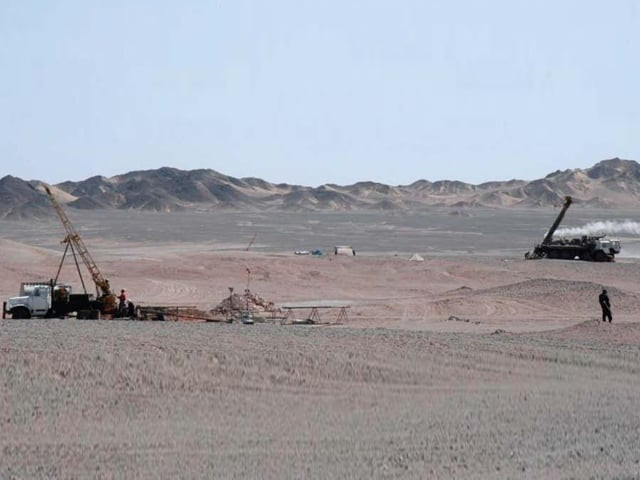Alternate view: How to scare away foreign investors
Why the uproar surrounding Reko Diq is unjustified.

The Tethyan Copper Company (TCC) is offering the Balochistan government an exceptionally good deal and the National Economic Council has been wise to accept it.
The constant barrage of allegations against the project, however, has been so strong that it has even moved the Supreme Court to investigate any potential wrongdoing. If bribes were indeed used by the company to either obtain the exploration contract or secure otherwise favourable terms, then that would be worthy of prosecution. Anything short of it should be beyond the scope of the court’s investigative powers. Incompetence, sadly, is not illegal.
That said, even a cursory examination of the regulatory structure of mining industry in Pakistan, the nature of the global mining business or even the actual agreement between Tethyan and the Balochistan government will reveal that the Reko Diq project is, at bare minimum, not an exploitative deal.
Regulatory hurdles
Mining in Pakistan is regulated primarily by provincial governments, although the role of the federal government cannot be ignored. In particular, the existing rules are structured heavily against the interests of mining companies and in a way that is certain to invite corruption and discourage investment.
In most countries with successful mining industries, for example, regulations allow the company that has been granted an exploration licence to automatically begin production once a sufficient reserve of minerals is discovered.
The rules in Balochistan differ in a very significant way. While the company that carries out exploration does have the right to start production, it is subject to further approval from the provincial government, which provides the bureaucrats and politicians an opportunity to change their mind. This is inherently unfair since the mining company invests heavily in the exploration process only because there is the prospect of being able to extract the minerals itself after they are discovered.
In the case of Reko Diq, TCC has spent over $220 million in exploration efforts. It should have the right to develop the field and profit from their extraction. Otherwise, why would it invest in the first place?
Tethyan’s willingness to invest in Balochistan at a time when nobody else is even trying should be rewarded by allowing them to move ahead with the extraction phase.
In fact, the only conceivable reason the provincial government would change its decision to award development rights to an exploration company is corruption. It is far too easy to use populist rhetoric against a foreign mining company to revoke their licence and then quietly sell off what are now proven mineral reserves to some other company in exchange for hefty bribes.
Mining industry compulsions
Mining companies around the world have a simple rule: winners pay for losers. Companies often go through as many as a dozen exploration sites or even more before they find a commercially viable reserve that can be extracted.
The mining company, however, has to pay for the exploration costs of all of its failed ventures in addition to the profitable ones. This is why the commercial feasibility point of a mine is set relatively high: if a mine cannot earn enough to pay for failed explorations, then it is not worth investing in.
It is unfair, however, to determine mining profitability purely on the basis of numbers from one mine. Several foreign mining companies have conducted dozens of failed exploration efforts. When calculating the rate of return for mining firms, the cost of those failed efforts should be incorporated. After all, they did pay for it.
The Reko Diq deal
The Tethyan Copper Company plans to invest up to $3.3 billion in developing the mine. In case it was not immediately obvious, that means $3.3 billion in foreign direct investment flowing into Pakistan. It is unlikely that the opponents of the project can name anything else that would attract that kind of investment into Balochistan under current circumstances.
For doing absolutely nothing other than being fortunate enough to be the government of the province, the Balochistan government gets a 25 per cent share in the company. This is in addition to the royalties it will be charging the company on revenues and does not include the corporate income tax that the company will be paying to the federal government.
When all of those outflows are factored in the share of Tethyan’s parent companies – Barrick Gold Corporation of Canada and Antofagasta of Chile – it will take away less than 50 per cent of the profits from the mine. Under what moral system is it unfair to Pakistan to put up none of the investment and get more than half the profits? By what logic can that be called exploitative?
Scaring the money away
The reality is that mining is one of those issues that are relatively easy to exploit by politicians. The target of ire is often a rich foreigner and the subject is the mineral wealth of the country. Yet any examination of the numbers suggests that the relationship is far from exploitative, and indeed tilted heavily in favour of the host governments. Populist rhetoric has a tendency to drive away the very small number of foreign investors currently still willing to risk their money in Pakistan. The country’s leaders should be encouraging them, not driving them away.
The writer is a financial and management consultant based in Karachi
Published in The Express Tribune, December 13th, 2010.

















COMMENTS
Comments are moderated and generally will be posted if they are on-topic and not abusive.
For more information, please see our Comments FAQ